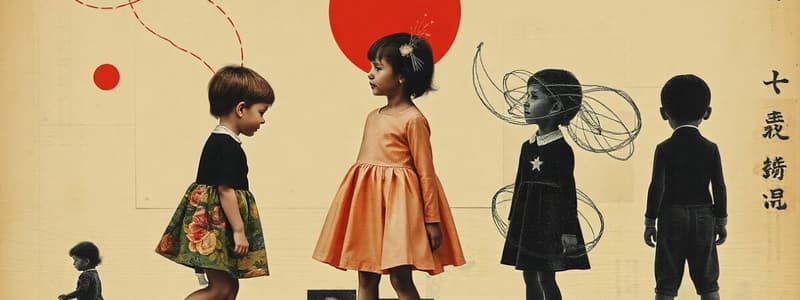Podcast
Questions and Answers
What are the four sub-stages of childhood?
What are the four sub-stages of childhood?
Infancy, Early childhood, Middle childhood, Adolescence
What critical developments occur during infancy?
What critical developments occur during infancy?
Physical growth, sensori-motor skills, cognitive development, language development, socio-emotional development
What are the major milestones of physical development in infancy?
What are the major milestones of physical development in infancy?
Lifting chin up (1 month), Sitting alone (8 months), Walking alone (15 months)
Give names of any 3 gross motor skills developed in childhood.
Give names of any 3 gross motor skills developed in childhood.
Give names of any 3 fine motor skills developed in childhood.
Give names of any 3 fine motor skills developed in childhood.
According to Piaget’s cognitive developmental theory, how many major stages of cognitive development are there?
According to Piaget’s cognitive developmental theory, how many major stages of cognitive development are there?
What are the two sub-stages of the Pre-operational stage?
What are the two sub-stages of the Pre-operational stage?
What physical activity can a 4-year-old typically perform?
What physical activity can a 4-year-old typically perform?
What is the importance of understanding physical and motor development?
What is the importance of understanding physical and motor development?
List any 3 major features of the pre-operational stage.
List any 3 major features of the pre-operational stage.
Describe any 3 major achievements of the concrete operational stage.
Describe any 3 major achievements of the concrete operational stage.
The development of empathy depends on ________ and __________ development.
The development of empathy depends on ________ and __________ development.
Girls in middle childhood attach more importance to good __________ relations while boys give more importance to their own social __________.
Girls in middle childhood attach more importance to good __________ relations while boys give more importance to their own social __________.
A child who is liked by some but disliked by other peers is called _______.
A child who is liked by some but disliked by other peers is called _______.
When two children are playing without interaction, it is called _________ play.
When two children are playing without interaction, it is called _________ play.
An internal determiner of emotional development is the child’s __________.
An internal determiner of emotional development is the child’s __________.
What do you understand by the term 'Socialization'?
What do you understand by the term 'Socialization'?
State the major types of parenting styles.
State the major types of parenting styles.
Flashcards are hidden until you start studying
Study Notes
Childhood
- Childhood is a significant phase in life marked by play, fantasy, and innocence.
- It's a period of rapid growth and development that sets the foundation for the entire lifespan.
- Childhood is divided into: infancy (birth to 2 years), early childhood (2 to 6 years), middle childhood (6 to 11 years), and adolescence (12 to 19 years).
Physical and Motor Development in Childhood
- Physical growth slows down in childhood compared to infancy.
- Changes in muscle and bone structure lead to the development of motor skills.
- While there are universal trends, individual differences exist in physical and motor development.
- Physical and motor development is crucial for the development of personality, social and emotional well-being, and emotional bonding between child and caregiver.
Gross and Fine Motor Development
- Gross motor development involves large muscle groups, enabling movement like crawling, standing, and walking.
- Fine motor development involves smaller muscle movements, typically with hands and fingers, for tasks like grasping and pinching.
Physical and Motor Development in Early Childhood (2-6 years)
- This stage is also known as the preschool age.
- Children become more mobile, expanding their sphere of activities beyond the immediate family.
- Children refine motor skills, becoming more graceful in running, jumping, and hopping.
- Fine motor skills improve, allowing children to engage in activities like building with blocks, coloring, and playing with toys.
- Most children are potty trained by 4 years of age.
Physical and Motor Development in Middle Childhood (6-11 years)
- Physical growth continues gradually with a slower rate of change until puberty.
- Children achieve greater control over large and small muscle groups, increasing coordination.
- There are gender differences in physical development, with girls experiencing a growth spurt earlier than boys.
Cognitive Development
- Cognitive development refers to how children learn and process information, including improvements in attention, perception, language, memory, and reasoning.
- According to Piaget’s cognitive developmental theory, cognitive development follows a sequence of stages:
- Sensori-motor stage (Birth- 2 years)
- Pre-operational stage (2-7 years)
- Concrete operational stage (7-11 years)
- Formal operational stage (11+ years)
Cognitive Development in Early Childhood
- Children become proficient in using symbols like words and images to represent objects, situations, and events.
- Language development is significant, with children expanding their vocabulary rapidly and learning grammar rules.
- Children become better at sustaining attention and become more selective in their focus, leading to improvements in perceptual skills.
- Thinking becomes more logical, and memory processing skills improve.
Cognitive Development in Early Childhood: Pre-operational Stage
- The Pre-operational stage has two sub-stages:
- Symbolic Function (2 to 4 years): Children create mental images of objects for later use.
- Intuitive Thought (4 to 7 years): Children learn through asking questions and are unaware of how they gained knowledge.
- Children in this stage show egocentrism, meaning they struggle to see the world from another's perspective.
- Children in this stage show centration, focusing on one specific characteristic of an object.
Middle Childhood Development
- Children in middle childhood (aged 6-12) develop logical thinking skills, facilitating reasoning beyond immediate situations.
- They acquire more adult definitions of words, understand synonyms, antonyms and how prefixes and suffixes affect meaning.
Concrete Operational Stage
- Key Characteristics:
- Understanding logical principles
- Improvement in spatial reasoning
- Logical thinking limited to real and concrete situations
Socio-Emotional and Personality Development
-
Early Childhood (2-6):
- Development of self-conscious emotions like shame and guilt
- Children evaluate themselves and learn to control emotions in social situations
- Empathy develops, depending on cognitive and language development
-
Middle Childhood (6-12):
- Children use social comparison to distinguish themselves from others
- They develop understanding of emotions like pride and shame
- Internalize and control values and feelings
- Gender differences emerge, with girls emphasizing interpersonal relationships and boys prioritizing social prestige
- Bullying becomes a prevalent issue with bullies exhibiting intrusive behavior and demanding parents, while victims often experience depression and low self-esteem
Socialization
-
The process of acquiring norms, values, and beliefs considered significant in a society
-
Agents of Socialization:
- Family
- Peer groups
- Schools
- Religious institutions
- Mass media (e.g., television)
-
Parenting Styles:
- Authoritarian: Demanding, controlling, insensitive
- Permissive: Indulgent, non-demanding
- Authoritative: Firm, consistent with reasons given for discipline
- Neglectful/Uninvolved: Disinterested, uncaring, low control and communication
-
Other Influencing Factors:
- Ethnicity
- Socio-economic status (SES)
- Cultural context
Physical Development
-
Early Childhood (2-6):
- Continued physical growth, slower than infancy
- Gender differences in growth with girls experiencing a spurt earlier during middle childhood
- Rapid development of gross motor skills
-
Middle Childhood (6-12):
- Continued development of gross and fine motor skills
- Marked improvement in muscular control and eye-hand coordination
Cognitive Development
-
Early Childhood (2-6):
- Pre-operational stage (Piaget's theory)
- Egocentrism
- Lack of conservation
-
Middle Childhood (6-12):
- Concrete Operational Stage (Piaget's theory)
- Conservation
- Transformation
- Seriation
- Logical thinking (limited to concrete situations)
- Difficulty with abstract concepts
Social Development
-
Early Childhood (2-6):
- Progress from parallel play to cooperative play
-
Middle Childhood (6-12):
- Gradual shift in focus from family to peers and school
- Peer acceptance becomes important for self-esteem and adjustment
Key Points on Socialization
- Family plays the primary role in early childhood socialization
- Influence of peers and school gains prominence in middle childhood
- Media plays a significant role in shaping values and beliefs
- Parenting styles strongly influence socialization and child development
- Cultural and social factors play a crucial role in shaping child-rearing practices and socialization processes
Studying That Suits You
Use AI to generate personalized quizzes and flashcards to suit your learning preferences.




